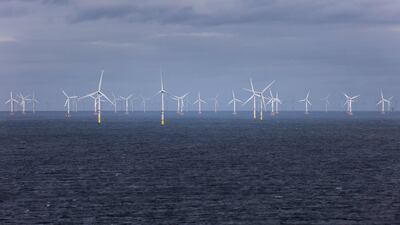UK Prime Minister Boris Johnson urged his social media followers to 'join him' and sign a wind turbine as an energy crisis continues to grip the country.
Mr Johnson issued the appeal to his 3.6 million Twitter followers on Wednesday, just hours after he delivered a key address to the Conservative Party conference in Manchester.
He said: “Join me in signing one of SSE's magnificent wind turbines to call for ambitious global climate action.”
SSE, one of the UK's largest providers of renewable energy, launched the petition to deliver a message to world leaders before the crucial Cop26 climate summit in Glasgow later this year.
Signatories will have their name emblazoned on the world's largest offshore wind farm, Dogger Bank, which is currently under construction in the North Sea.
The prime minster's message comes as households across Britain face soaring energy bills caused, in part, by a collapse in wind power.
Wind turbines typically provides around a quarter of Britain's energy needs. However, dwindling wind speeds have resulted in energy crunch, sending demand for some fossil fuels, such as gas, to record highs.
Officials sought to reassure consumers that Britain's infrastructure will be able to get enough gas into the country to see it through the winter.
National Grid Gas Transmission said that Great Britain will have a “positive supply margin” — that is to say it can access more gas than is being used during peak demand.
It said that the country has access to flexible supplies of gas from abroad, including liquid natural gas (LNG), which is brought in on ships, and gas pipes from Europe.
This will be enough to meet all the scenarios of peak demand that National Grid experts have predicted could happen from October to the end of March.
It comes despite a major rise in world gas prices, which was caused by high demand from reopening Asian economies, among other things.
But as in previous winters, gas sellers will “require a positive market price differential in order to flow to Great Britain from both European and global markets,” National Grid said.
It means that British buyers will have to compete with international buyers for their gas.
“We have a positive gas supply margin in all of our supply and demand scenarios, and there is a positive storage position as we enter the winter,” said Ian Radley, director of gas system operations.
“We have a range of tools available to manage any operational requirements that we might encounter.”
Meanwhile, the National Grid Electricity Electricity System Operator (ESO) said the electricity system's capacity should also cope with the winter.
“The Winter Outlook confirms that we expect to have sufficient capacity and the tools needed to meet demand this winter,” said ESO boss Fintan Slye.
“Margins are well within the reliability standard and therefore we are confident that there will be enough capacity available to keep Britain's lights on.”
The gas system operator also said that it expects demand to be just 49.4 billion cubic metres (bcm), down from 50.7 bcm to 53.3 bcm over the last five years.
This drop in demand is in large part down to a drop in demand for gas for electricity production, as more wind power is built.
National Grid Gas Transmission has the task of providing the gas grid across Great Britain and occasionally stepping in to ensure the system is balanced.
However it does not itself supply gas into the grid.
Around half of Britain's gas demand is used to heat homes, another quarter is used to generate electricity.
Responding to the prime minister, social media users said Britain's green energy plan is off-course, while other pointed out their energy costs have almost doubled in the space of a few weeks.
When completed, Dogger Bank will provide enough energy to power six million homes across the UK and is a crucial piece in helping Britain achieving carbon-neutrality by 2035.


